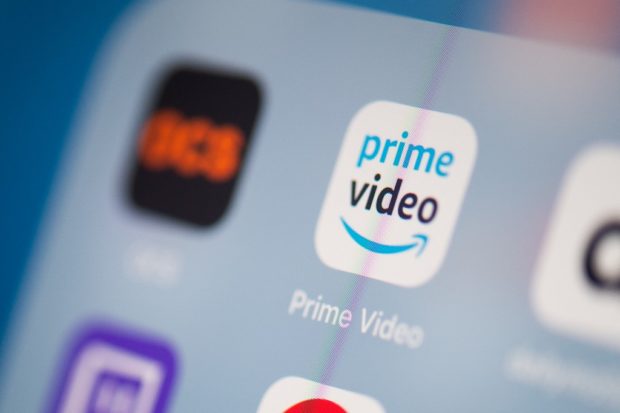Netflix or Prime Video? Streaming wars come to Thailand

This file illustration photo taken on July 24, 2019, shows the logo of the US online streaming Amazon Prime Video application on the screen of a tablet in Paris. International streaming platforms were among the biggest pandemic winners, seeing subscriber numbers soar, but as countries reopened, US giants have turned abroad—with Thailand firmly in their sights. MARTIN BUREAU / AFP
BANGKOK, Thailand—International streaming platforms were among the biggest pandemic winners, seeing subscriber numbers soar, but US giants have turned abroad as countries re-opened—with Thailand firmly in their sights.
The kingdom’s high internet penetration, long-standing and highly regarded film industry—as well as roughly six million active users of streaming services, according to 2021 data—present a golden opportunity.
Big players such as Amazon Prime and Netflix, which claim 200 million and 220 million subscribers worldwide respectively, have taken note as new sign-ups have leveled off in more established markets such as North America and Europe.
October saw the launch of Prime’s Thai-service Prime Video at almost the same moment Netflix announced six locally produced films and series for the coming months.
“The competition is everywhere,” said Malobika Banerji, director of content for Southeast Asia at Netflix, which has a regional hub in Singapore.
Nowhere is that more apparent than Thailand’s capital, where Prime’s “Lord of the Rings” spinoff mega-production “Rings of Power” jostles for attention with Netflix’s latest South Korean series on billboards.
“We do believe that Thailand will be a big part of our subscriber growth in the years to come,” said Prime Video’s director of international development Josh McIvor.
“Our goal is really to try to be the most local of the global streaming services,” he said, pointing toward their earlier expansion into Japan—where they outstrip Netflix.
However, their rival’s longer-term investment is apparent: Netflix saw a 20 percent growth in Asia-Pacific subscribers last year, according to a recent quarterly report by the firm.
Seeking the next ‘Squid Game’
While big-ticket international series such as “Rings of Power” lead the publicity, the streamers see locally produced content—such as Prime’s hugely successful Indian crime-thriller “Mirzapur”—as the longer-term workhorses of their offering.
The two fundamental “pillars” to success are local originals—”across scripted, unscripted and film”—and licensed locally produced series, according to Amazon Studios’ director of local content Erika North.
It is the second that drew Prime to Thailand, she said: they hope to build on a long Thai film history with higher production values than elsewhere in the region.
Similarly, Netflix is betting big on local content going international, dreaming of the next “Squid Game,” the South Korean critical and commercial blockbuster.
Netflix’s Banerji said there were “more and more” examples of this, citing Thai mystery-thriller series “Girl from Nowhere.”
Streaming analysts have been watching the US firms—including Disney+– to see if they can compete with local rivals.
A report from the consultancy Kantar this year found streaming had edged out traditional watching in the Philippines, Singapore, Malaysia, Vietnam, Thailand and Indonesia.
But Thailand has a special appeal, said Vivek Couto, executive director and co-founder of Media Partners Asia (MPA), which monitors streaming platforms.
An analysis from MPA this year forecast the expected income from streaming in Thailand in 2022 at around $809 million.
Couto said the kingdom offered an established creative community, more advanced broadband infrastructure than other Southeast Asian countries—and a population with the “most propensity to pay for online video content.”
Creative control
Almost a third of Thai households already subscribe to an on-demand streaming service, according to their data, far ahead of Indonesia (12 percent) or Vietnam (4 percent).
“If content really works locally and (is) sustainable, then it will travel anywhere,” Couto said.
“I think that’s why Amazon and Netflix are seeing the potential of Thai producers, Thai series.”
While Thai cinema has enjoyed occasional critical success—director Apichatpong Weerasethakul has won several prizes at the Cannes Film Festival, including the top award in 2010—it has not become an established global force.
Local directors and producers are cautiously optimistic the new interest from deep-pocketed streaming giants could give the local industry a boost.
“Some content, you cannot even dream of doing it with a studio, but with streaming, it is possible,” said Wisit Sasanatieng, director and producer of upcoming Netflix crime film “The Murderer.”
Thai producer Cattleya Paosrijaroen, co-founder of the independent company 185 Films, welcomed the shift.
International firms could bring in better standards, she said, offering better conditions to crews currently expected to work 16-hour shifts.
But she struck a note of caution.
“If your film is being produced by Netflix, they can control the content,” Cattleya said. /ra
RELATED STORIES:
How Netflix went from foe to friend in Indonesia
Amazon Prime Video challenges Netflix on global arena
Added platform: Local producers now collaborating with Prime Video